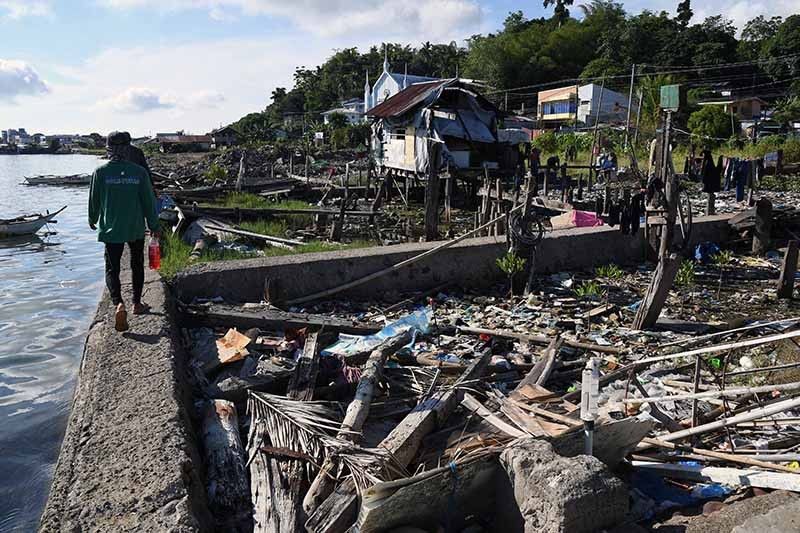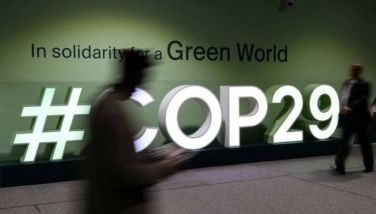For most Filipinos, climate change threatens human health, mental well-being

MANILA, Philippines (Updated 02/23/24; 10:20 a.m.) — Eight in 10 Filipinos believe that climate change poses dangers to their physical and mental health, according to a survey by the Social Weather Stations (SWS) released Thursday.
The December poll showed that 88% of the 1,200 people surveyed by the SWS perceived the impacts of climate change as dangerous to their physical health, while only 12% disagreed.
Similarly, 81% considered climate change a threat to their mental well-being. Only 19% said it is not a danger to their mental health.
Beyond its well-documented environmental impacts, climate change carries far-reaching implications for human health, with the World Health Organization calling it the single biggest threat facing humanity.
The climate crisis drives extreme weather events such as cyclones and intense heat waves, claiming lives, and fueling the spread of infectious and food-, water- and vector-borne diseases.
These disasters, coupled with uncertainty surrounding the future of the planet, also exacerbate mental health issues like anxiety and depression.
“Our fellow Filipinos have now spoken—climate change is a public health issue,” Dr. Renzo Guinto, chair of the Philippine Medical Association’s committee on environmental health and ecology, told Philstar.com.
“The Philippine health sector must now come up with a long-term adaptation and resilience plan to ensure we are able to protect Filipinos from the health impacts of climate change—both physical and mental,” he added.
Guinto also urged the government to demand major polluters to rapidly decarbonize in order to prevent dangerous levels of global warming.
Negative emotions dominate
According to the SWS, those who reported severe climate impacts in the past three years were more likely to perceive the impacts of climate change as dangerous to their physical and mental health.
The polling firm revealed that 87% of Filipinos have personally experienced climate impacts in the past three years, with 17% experiencing severe impacts, 42% moderate, and 24% little. Only 13% of Filipinos did not feel any effects of the climate crisis.
The percentage of those who reported personally experiencing climate change fell by seven points from October 2023 and six points from December 2022. But the figure remained similar to levels observed in March 2013 and 2017.
A significant majority (73%) of Filipinos were already aware of climate change before the SWS survey, while 27% learned of it only during the interview.
The Philippines is among the countries most vulnerable to climate change’s devastating impacts, including strong typhoons and rising sea levels, which disproportionately affect marginalized and vulnerable communities.
The SWS survey also showed that 93% of Filipinos felt at least one kind of emotion due to climate change, mostly negative (87%) and some positive (37%). The remaining 7% said they did not feel anything.
Sadness (56%), anxiety (43%), and fear (43%) were the most prevalent emotions associated with climate change. They were followed by depression (16%), anger (11%), hopelessness (11%), feeling of being responsible (4%), and guilt (4%).
On the other hand, patience (22%) emerged as the most positive emotion, followed by hope (7%), calmness (7%), courage (6%), happiness (6%), feeling of being irresponsible (2%), excitement (1%), and innocence (1%).
Climate action
The poll also found a decline in optimism on humanity’s ability to combat climate change. While 57% of Filipinos think humans can still stop or slow down the crisis if they really tried, 39% see it as already beyond their control.
The percentage of respondents expressing confidence in humanity’s ability to control climate change dropped by 12 points from October 2023 and 19 points from December 2022.
Seventy-four percent of the respondents agreed with the statement: “People like me can do something to reduce climate risks.” Only 17% were undecided, and 9% disagreed with the statement.
This yielded a net agreement score of +65 (very strong). The SWS said this “indicates a very strong personal efficacy to do something to reduce climate risk.”
“Net agreement on personal efficacy to do something to reduce climate risk also fell over the past year, but not enough to be considered a downgrade,” the pollster said.
The SWS poll also showed that 39% of the respondents reported taking action to mitigate climate risks in the past three years, while 61% remained inactive.
Among those who participated, 18% contacted local government employees, 12% engaged with community leaders, 8% reached out to political party officials, 8% got in touch with civil society organizations, 7% provided financial or material donations, and 7% communicated with national government employees.
The survey, conducted from December 8 to 11, interviewed 1,200 adults face-to-face nationwide. The sampling error margin was ±2.8% for national percentages and ±5.7% for regional breakdowns.
- Latest




























